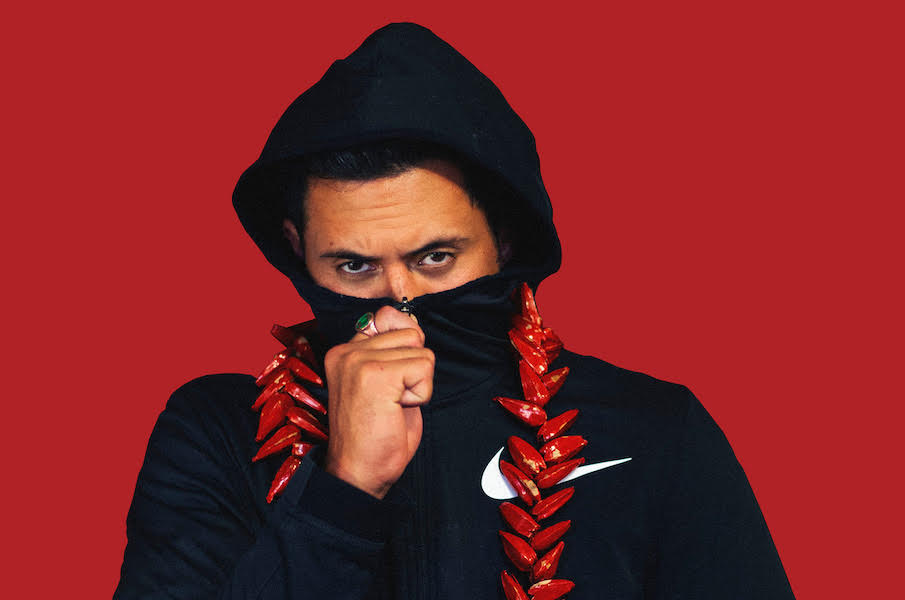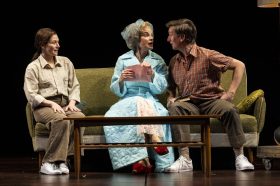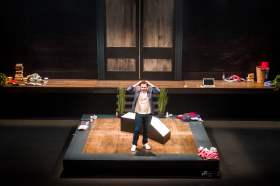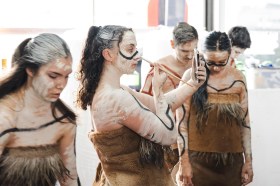Lele is a Western Edge production, developed by Western Edge co-Artistic Director Chanella Macri and Western Edge artists Rexson Pelman and Michael Logo, and performed by an ensemble of six Samoan performers at the Bowery Theatre in the Melbourne suburb of St Albans, as part of the Neighbourhood Festival. It’s an adaptation of Lele, Butterfly, a 2018 Western Edge production, itself adapted from Sophocles’ Antigone.
Macri was moved to tears as she opened the evening, expressing her gratitude at getting to work on the land of the Kulin Nations and share stories. Michael Logo joined her, and the pair proceeded to take turns delivering the introduction, operating with an ease and connectedness that appeared to be shared by all the actors in Lele.
At the heart of the play is a Samoan family living in Australia. Changing the relationship structures from Sophocles’ original play, here Creon is the head of the family, who raises his sons according to his understanding of honour and duty. But when the two of them kill one another, a cascade of tragedy ensues. Creon, blaming Polyneices, denies him a proper burial, and says that anyone who disobeys him will be kicked out of the family. Antigone, fiancé to Creon’s son Haemon, knows about losing family more than most. But she chooses to bury Polyneices – standing up for what she believes in when no one else will.
In the opening address, Macri noted that while Lele was informed by lived experiences, ‘we know that everything may not honour your experience’ and ‘we are trying, we are learning’. The actors’ performances were infused with a similar kind of humility – perhaps better described as a responsiveness or lightness. For example, after a roller door that was a part of the set became damaged and no longer reliably held in its overhead position, the actors (as their characters) held it for one another as they passed below.
In a heated moment, a plate broke and then a chair leg snapped, and while it was hard to tell which break was planned, both were integrated into the scene. Indeed, the actors’ readiness to play upon new details balanced heavy content with humour and relief. It also meant that every subsequent break, blow or cry was afforded incredible and believable resonance and, in appearing so real, certain moments were hard to watch. However, portrayals of violence go deeper than merely being influenced by the original story of Antigone.
Lele was situated in a clear and relatable world: geographically, temporarily and culturally. Lines to the effect of ‘don’t leave me alone with your Aunty again – she wasn’t too pleased with my Samoan’, as well as specific references to places like Dandenong, effortlessly drew laughs and nods from the audience. For me, numerous references, both humorous and dark, were framed and bolstered by reactions from audience members.
Lele didn’t tidily resolve – which felt entirely appropriate. How could we expect these characters to reconcile what they’ve been through? But interesting shifts occurred in the way the audience was addressed, and implicated, as if we were a church congregation, a jury, a god. The characters pleaded, questioned and recognised that as individuals they don’t hold all the answers and, in this sense, despite everything they’d been through, the family connected through their capacities to hold space for one another.
Read: Theatre review: Coldhands, RUMPUS
Throughout Lele, Creon’s wife Eurydice implored the men around her to access their forgiveness. She expressed herself through words and song, with her velvety voice pouring from her whole body, beautiful and pained. By the end, when she’d lost all four of her children, she extended her voice to the ‘children of Samoa’. ‘We don’t remember,’ she said. ‘We don’t know what to do with our power.’
Her speech was breath-taking. She told of the vitalness of shedding tears of grief, of speaking and of love. She recognised that ‘we are busy, trying to hold [our children] between worlds and not let them fall’. She closed with the words: ‘We are vast. We are whole. We are healing.’
Lele was performed by sensationally talented actors with oodles of chemistry and a visible passion for sharing story and craft. I don’t know if additional seasons are planned, but I certainly hope so!
Lele by Western Edge; Michael Logo, Chanella Macri and Rexson Pelman
Bowery Theatre
Lele was performed from 24-26 November 2022.





